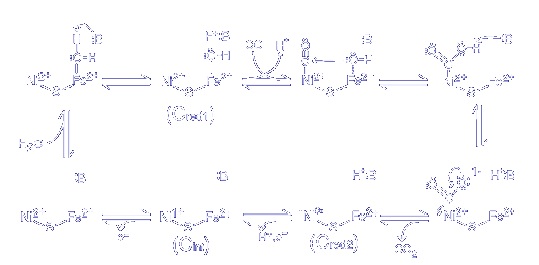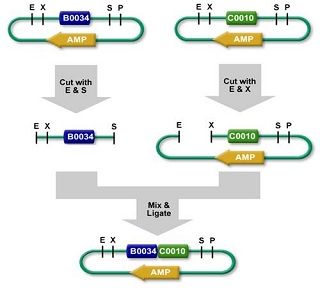Team:METU
From 2012.igem.org
1. Biological Carbon Monoxide Filter:The aim of the Project is to express CODH (Carbon monoxide dehydrogenase) enzyme found in different types of bacteria in cyanobacteria. This enzyme converts CO to CO2 using the reactions below: CO2 + 2H+ + 2e- <-> CO + H2O Once the CO2 binds, there is a subtle change in the shape of the enzyme that prohibits the CO, when released from the active site, from escaping into the cytoplasm. Being cut off, there is only one escape: move through the molecular tunnel in the enzyme to the A cluster situated by the exit. One electron comes from the reduced B cluster, and one electron cones from the reduce C cluster itself. This is a reversible reaction; it's conceivable that the toxic effects of CO can be somewhat neutralized by the cell by turning it into CO2. However, since CO is not common in the environment it is doubtful that the bacterium uses the reversed reaction to save itself. By the way, the name carbon monoxide dehydrogenase comes from the class of enzymes to which this activity belongs. You'll notice there is no hydrogen on CO2 to dehydrogenate, but if you reverse the reaction above, you can see what is dehydrogenated. CODH is important for maintaining current atmospheric conditions. Microbial metabolisms of CO maintains ambient CO at levels safe for other forms of life 2. Human Voice Induced Gene Circuit Using Electrically Induced Promoters:In this project, our aim is to use human voice as a signal, and stimulate a biological system in bacteria by this signal. For this purpose, first human voice is converted to electrical signals by an designed electronic device. In the second part of the project electrical signals coming from electronical device stimulate a promoter and induce a gene expression. According to frequency of voice, different currents are created by device, and we will try to activate different systems in bacteria by different currents. To see whether this system will work or not, we are planning to use marker genes (such as GFP, RFP or luciferase) as activated by electric stimulus. If we succeed to run this system, the future perspectives are to put more complicated gene circuits under this mechanism. We will use Bacillus Subtilis 168 strain for this project since it is more resistant to environmental stress than E.coli.
| |
| Team METU |
| Home | Team | Official Team Profile | Project | Parts Submitted to the Registry | Modeling | Notebook | Safety | Attributions |
|---|
 "
"


